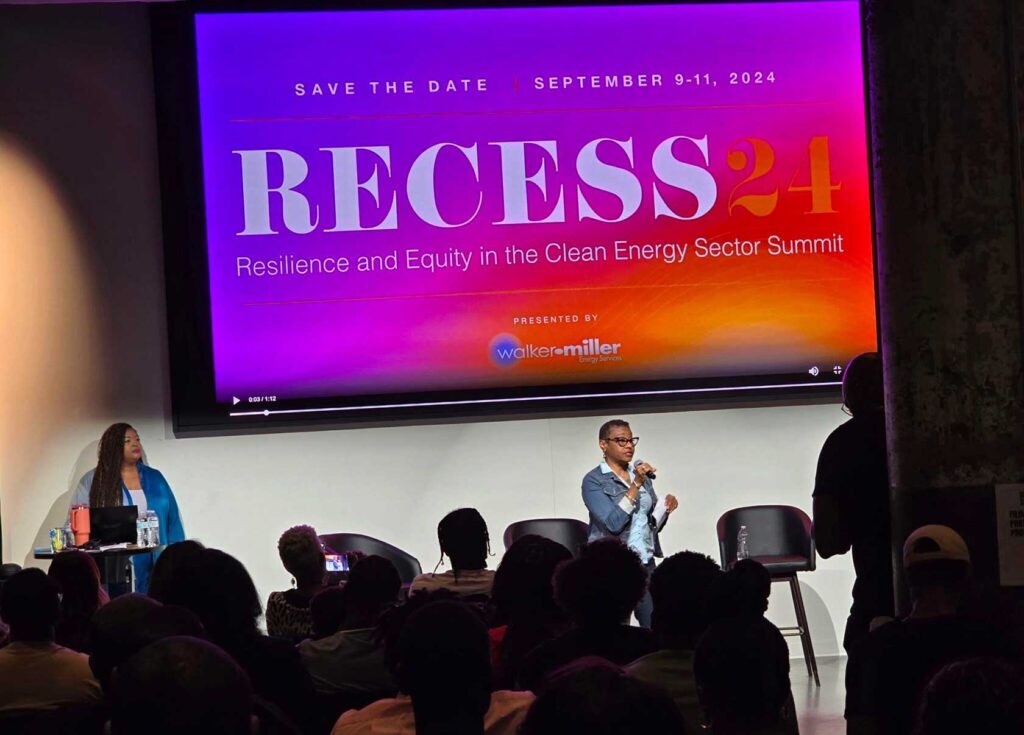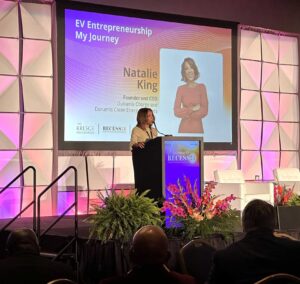
Despite the headlines and lawsuits, diversity, equity and inclusion are still pillars of so many industries where there lacks representation from Black and brown people.
Among emerging fields where Black and brown people have been historically excluded, the clean energy space is spotlighted. Spending will surpass the $2 trillion mark this year globally, according to the International Energy Agency, and it’s a sector dominated in America by white people.
“Clean energy investment is setting new records even in challenging economic conditions, highlighting the momentum behind the new global energy economy,” IEA Executive Director Fatih Birol said in a statement. “For every dollar going to fossil fuels today, almost two dollars are invested in clean energy.”
But insert Carla Walker-Miller and her revolutionary RECESS summit: Resilience & Equity in the Clean Energy Sector Summit.
From Sept. 9 to 11 at the Renaissance Center in Detroit, Walker-Miller and hundreds of other Black and brown clean energy investors, entrepreneurs, educators and enthusiasts gathered to discuss the possibilities of more people of color becoming instrumental in the space – not just in Michigan, but all around the world.
“Hearing people say how rewarding this conference was means everything. It means that I at least met our base goal, which is making people feel welcome in the clean energy industry,” she said.
“This conference is a fulfillment of the start of a dream. I’ve been in the energy industry for almost 40 years, and I never felt welcome in the industry until maybe the last five years. I want people to feel invited and welcomed and valued. I want them to be able to make great money and create great lives — generational wealth — and solutions for our own community. So, it really is a future for us, for Black and brown people. We could run this industry, and we could define this industry.”

Natalie King, founder and CEO of Dunamis Clean Energy Partners, LLC, and Dunamis Charge addresses the crowd at RECESS24. PHOTO: COURTESY OF THE RECESS24 CONFERENCE TEAM
The conference was complete with keynote speakers and panel discussions ranging from the clean energy transition to local and federal clearances that have allowed for more clean energy investments and talks about how to secure funding for individuals looking to break deeper into the space.
“One of the reasons that’s important for me is that there really was no catalyst. Like most Black and brown people in professional industries, I had to prove myself again and again and again, I had the burden of all over-performance, I had the luxury of being misjudged and minimized, and the assumption that I would not be good, right, and it was really painful,” Walker Miller said.
“But it was consistent performance, the blessing of God, and making sure that we were excellent so that we could make room and make space for other Black and brown people. Nobody needs to go through that and hopefully this conference is that catalyst for the change I was hoping to see for so long. I pray that people who attended this conference feel that, but when they come to this conference, they’re coming into a community that gets and understands this industry and has the door open for them.”
Komal Doshi, vice president of beneficial electrification & mobility at Walker-Miller Energy Services, said during a panel discussion that professionals in this space, especially Black and brown ones, are lucky to be living and working in a state that provides so many connections and resources.
Doshi said that in her previous role at the small business incubator Ann Arbor SPARK, she was able to help connect people with ideas to the doers and executors across the state, all with the help and support of state leaders.
“Now it’s about developing a workforce and building our access to resources. It’s about getting people educated about opportunities so that we can stay on track with things,” she said.
Dr. Tony Reames, the director of University of Michigan’s Detroit Sustainability Clinic and recent deputy director for energy justice at the U.S. Department of Energy, was one of four panelists on a talk titled, “The $500 Million Question: Virtual Power Plants, Carbon Capture and Sequestration, and Energy Storage.”
Afterward, Reames talked about how conference-goers and people interested in the clean energy space should go about taking RECESS from academic discussions to lived realities.
“You know, talking to Carla Walker-Miller, the founder of this conference, last year, it was this recognition that there’s a major opportunity to transform this country from an energy perspective, but we wanted to make sure that Black and brown communities don’t miss this opportunity. There’s not a space for us to come together all under one roof to talk about the role of energy in our lives from both as consumers, but also producers and businesses in the energy space, and so that’s why this conference is so important” he said.
“So, there’s a multi-pronged approach to taking what we’ve learned and talked about here and making it a reality. One is the recognition of the past harms and injustices of the energy system and how that impacts communities of color. The opportunities that exist to do something about it and the collaborations that are needed – discussing these things at a conference like this allows people to network, because it can be very daunting for one company to try to access the resources that exist,” Reames added.
Walker-Miller said she’s focused on similar goals for next year’s conference and beyond.
“Next year, our main goal is profitability, because part of our goal this year was for one-third of the people to get here free. Equity means access and money is a barrier to equity, so to raise enough money so that 50% of the people can come for free and we can still make a profit – that’s the goal. It’s all positive and God’s timing is always right, and I just thank Him for the vision,” she said.
“Detroit should be the epicenter for this type of event. I came to Detroit kicking and screaming, and it took me more than 10 years to realize that this is exactly where I’m supposed to be,” Walker-Miller added. “Detroit has been such a blessing to me. I can’t imagine living anywhere else and because of what Detroit has done for me, I want to do everything I can for the amazing, amazing people in Detroit.”
It’s clear that she has been uniquely positioned – by hard work, faith, dedication and determination – to be in the position to host such a well-respected conference, one where even Detroit Mayor Mike Duggan returned for the second iteration this year to deliver another keynote address.
“This isn’t a moment, it’s a movement. Just recognizing that there are Black and brown people who are thinking about energy as a means to create generational wealth to reduce harm and burden in our communities allows us to go into spaces that we aren’t typically in,” said Reames.
“I think being able to understand the full spectrum of this will allow us to keep this movement going, and now we know what to ask for because we’ve seen it. So we can say that this is what it takes to transform this community, this is what it takes to transform this industry. And that’s how you keep the movement going, because then we can hold accountable our politicians, our utility companies, our public service commissions.”
As the future of the clean energy sector continues to take hold, especially in the wake of an election where the candidates have opposing views about clean energy investing, it is especially important to continuously break barriers and push for more inclusion in the space.
“It can be daunting for somebody that’s not in this space to think about how to break into the space, but coming together in one place, seeing people that look like you, hearing the stories of entrepreneurs, longtime business owners, people in higher education, you know, just hearing all of these different stakeholders that look like you will allow us to actually take advantage of this opportunity,” said Reames.
“One thing I learned is that we’re doing this all across the country. We know the place that Detroit has when it comes to mobility and the decarbonization of our transportation industry, but it’s happening in other parts of the country. We can all hear these different stories and how these technologies show up in different parts of the country. You can use those examples to make a difference wherever you are, so we can truly learn from others and apply it at home,” Reames said.
This post appeared first on Michigan Chronicle.






